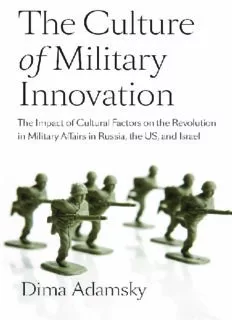
The Culture of Military Innovation: The Impact of Cultural Factors on the Revolution in Military Affairs in Russia, the US, and Israel. PDF
Preview The Culture of Military Innovation: The Impact of Cultural Factors on the Revolution in Military Affairs in Russia, the US, and Israel.
The Culture of Military Innovation The Culture of Military Innovation THE IMPACT OF CULTURAL FACTORS ON THE REVOLUTION IN MILITARY AFFAIRS IN RUS SIA, THE US, AND ISRAEL Dima Adamsky Stanford Security Studies An Imprint of Stanford University Press Stanford, California Stanford University Press Stanford, California © 2010 by the Board of Trustees of the Leland Stanford Ju nior University. All rights reserved. No part of this book may be reproduced or transmitted in any form or by any means, electronic or mechanical, including photocopying and recording, or in any information storage or retrieval system without the prior written permission of Stanford University Press. Special discounts for bulk quantities of Stanford Security Studies are available to corpora- tions, professional associations, and other organizations. For details and discount informa- tion, contact the special sales department of Stanford University Press. Tel: (650) 736– 1782, Fax: (650) 736– 1784 Printed in the United States of America on acid-f ree, archival-q uality paper Library of Congress Cataloging-i n-P ublication Data Adamsky, Dima. Th e culture of military innovation : the impact of cultural factors on the revolution in military aff airs in Rus sia, the US, and Israel / Dima Adamsky. p . cm. I ncludes bibliographical references and index. ISBN 978- 0- 8047- 6951- 8( cloth : alk. paper)— ISBN 978- 0- 8047- 6952- 5( pbk. : alk. paper) 1. Soviet Union— Armed Forces— Technological innovations. 2. Military art and science—T echnological innovations—S oviet U nion. 3 . S trategic culture—S oviet U nion. 4. United States— Armed Forces— Technological innovations. 5. Military art and science— Technological innovations— United States. 6. Strategic culture— United States. 7. Israel— Armed Forces— Technological innovations. 8. Military art and science— Technological innovations— Israel. 9. Strategic culture— Israel. I. Title. UA770.A57 2010 355'.07—dc22 2 009021452 Typeset by Westchester Book Group in 10/14 Minion To my grandfathers, Jewish offi cers in the Soviet Army during the Great Patriotic War, whose examples always inspired me. CONTENTS Ack nowl edgm ents ix Introduction 1 1 Cognitive Styles and Understanding Revolutions in Military Aff airs 15 2 Th e Impact of Cultural Factors on the Soviet Military- Technical Revolution 24 3 Th e Impact of Cultural Factors on the US Revolution in Military Aff airs 58 4 Th e Impact of Cultural Factors on the Israeli Revolution in Military Aff airs 93 Conclusion 1 31 Notes 1 45 Index 2 23 AC KNOW LEDG MENTS The responsibility for the views and mistakes of this book is mine alone. Th e better parts of this work would not have been possible without the gener- ous assistance of many people, and I would like to briefl y express my debt of gratitude to them here. It was Uri Bar- Joseph of Haifa University who grounded my professional fascination with defense transformations in academic research, during our discussions about international politics and modern strategy in one of the fi nest coff eehouses i n Tel Aviv. F rom m y d isorg an ized a nd a ssociative thoughts, he developed a coherent observation about the puzzling intellectual history of the RMA in the USSR, the US, and Israel. Explaining variation in innovation across military organizations became the essence of my disserta- tion and the topic of this book. I owe him my deepest gratitude for the idea of this work, for his devoted supervision, and for several other important deci- sions that I have made. Each student and practitioner of international security dreams of having this kind of superb academic mentor. Ben D. Mor suggested the conceptual framework suitable to deal with this empirical puzzle and in- troduced me to the world of IR theories. My research would not have been possible without the academic assistance of Gabriel Ben-Dor and Abraham Ben- Zvi, all of them from the School of Po liti cal Sciences at the University of Haifa. In the middle of working on this project, I was exceptionally fortunate to relocate to the John M. Olin Institute for Strategic Studies at Harvard Univer- sity. Intellectual life at Harvard opened unparalleled opportunities for en- hancing theoretical and empirical knowledge. It was an academic honor and ix
Description: